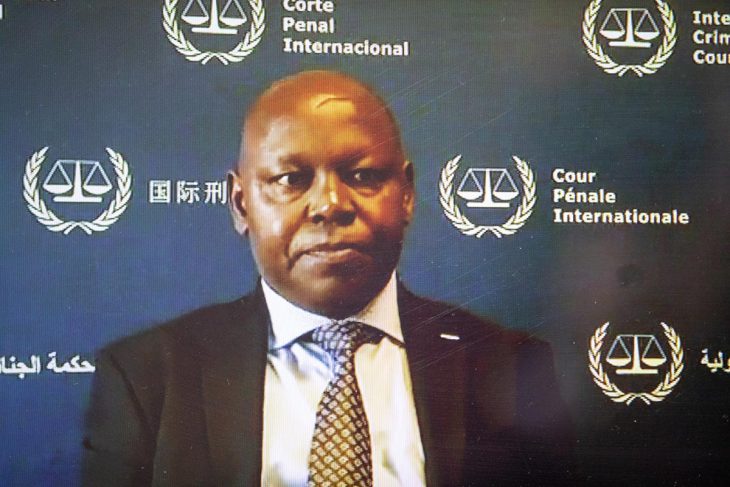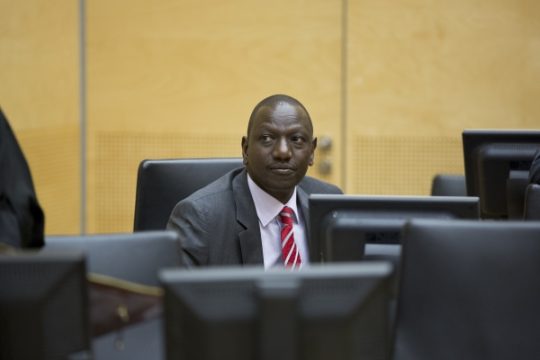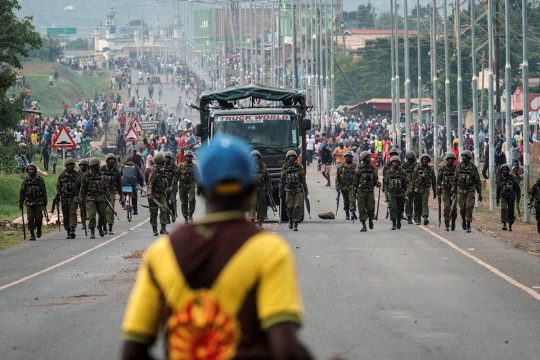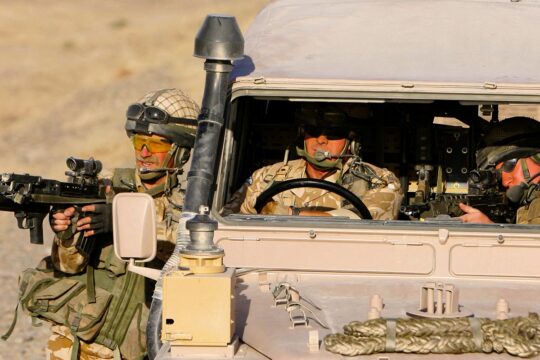To listen to the podcast, click on the "play" button below:
Dapper, respectful and self-confident, Paul Gicheru looked exactly who he is – a successful Eldoret-based lawyer – when he appeared on Friday at the International Criminal Court (ICC) via video link from the detention unit in Scheveningen. He took the opportunity, while representing himself, to try to scotch rumours that he had been coerced in any way to turn up in The Hague and that he was going to plead not guilty: “I do not intend to admit the charges…The allegations read out to me are not true. They are false”.
But the damage has already been done in Kenya among the chattering classes. That Gicheru – who had succeeded in outwitting the ICC prosecution back in 2017 when he had a High Court ruling, contradictory to an ICC warrant, which left him in no danger of being transferred to The Hague against his will – wanted now genuinely to be in The Hague, was beyond most commentators’ abilities to believe. Wild rumours ascribed motives related to the current electioneering between president and vice president, each of whom had had their time in the dock in The Hague, and had escaped with barely dented reputations. Any dirt that Gicheru may be primed to provide the ICC about either president Uhuru Kenyatta or vice president William Samoei Ruto, is purely speculation. It would only be if he has specific new evidence that the prosecutor could attempt to convince judges to reopen either case. But it helps to sell newspapers.
Bribery or attempted bribery of six prosecution witnesses
For now, the detail of the precise case against Gicheru – who has built up his law practise for the last two decades in Ruto’s political home base, Eldoret – and is charged with either bribing or attempting to bribe six prosecution witnesses, mostly in the case against Ruto, is all that observers really have to go on. “The arrest warrant gives very specific figures that the prosecution referred to in terms of the monies that were allegedly offered, going up to approximately 47.000 U.S. dollars. That indicates possibly the prosecution has some sort of paper trail of transactions,” says Kenyan journalist Tom Maliti of IJ Monitor.
This development revives memories of the Kenya cases at the ICC and the acrimony which surrounded them. There were multiple dramas, such as before the proceedings, the fevered speculation around which precise names would be deemed responsible for the deaths, tortures, looting and mass displacement of different ethnic groups in the violence that took place after disputed elections in 2007; And then there was how the ICC prosecution attempts were used by senior Kenyan politicians to present themselves as anti-neo-colonial warriors fighting off a foreign court.
Gicheru: another light on prosecution flaws?
Most seriously for the court and for the reputation of the office of the prosecutor is the fact that the cases collapsed ignominiously. A review was commissioned – handled by Sierra Leone Residual Court prosecutor Belinda Hollingsworth and made public before last year’s annual meeting of states parties to the ICC. It gives the investigation a serious tongue lashing, especially the prosecution leadership and first prosecutor Moreno Ocampo. His successor Fatou Bensouda prefaced her publication of the critical summary with a long list of improvements she said had now been made. Ocampo complained in a written response that the experts had not focused “on the Kenya’s authorities interfering [with] witnesses”. Lawyers for the defendants said the review justified their approach and showed a prosecution that “wilfully shut it eyes to the flaws in its own case”. Kenyan authorities said it confirmed multiple issues “with identification and collection of evidence, identification of suspects, manipulation of witnesses and improper influence by intermediaries”.
The Gicheru proceedings will reopen those wounds. The charges he faces go to the heart of the difficult circumstances that the judges faced. Right from the start there were clear attempts to undermine the court’s authority. In the Ruto and Sang trial, recalls Maliti, “the first witness who testified was always a target of a social media campaign to reveal their identity… Then in addition to that, there are allegations of prosecution witnesses being bribed or attempts being made to bribe them. And those combined, the judges said, contaminated the case to such an extent that there was no way they could make a fair assessment of the evidence because it was difficult for them to gauge whether a witness was testifying truthfully or not. And therefore, they then stopped the case”.
This new bribery Kenya case at the ICC will provide potential fodder for the politicians. But whether it manages to clear the fog around who bears responsibility for the violence that displaced tens of thousands, is unlikely.
 ASYMMETRICAL HAIRCUTS
ASYMMETRICAL HAIRCUTS
This podcast has been published as part of a partnership between JusticeInfo.net and Asymmetrical Haircuts, a podcast on international justice produced from The Hague by journalists Janet Anderson and Stephanie van den Berg, who retain full control and independence over the contents of the podcast.








